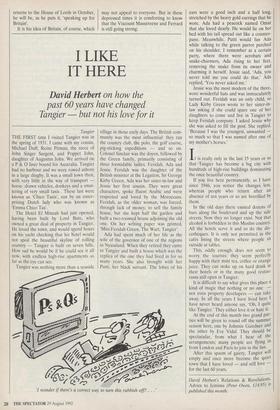I LIKE IT HERE
David Herbert on how the
past 60 years have changed Tangier — but not his love for it
Tangier THE FIRST time I visited Tangier was in the spring of 1931. I came with my cousin, Michael Duff, Reine Pitman, the niece of John Singer Sargent, and Poppet John, daughter of Augustus John. We arrived on a P & 0 liner bound for Australia. Tangier had no harbour and we were rowed ashore in a large dinghy. It was a small town then, with very little in the way of transport horse- drawn vehicles, donkeys and a smat- tering of very small taxis . These last were known as 'Chico Taxis', run by an enter- prising Dutch lady who was known as 'Emma Chico Tax'.
The Hotel El Minzah had just opened, having been built by Lord Bute, who owned a great deal of property in Tangier. He loved the town, and would spend hours on his yacht checking that his hotel would not spoil the beautiful skyline of rolling country — Tangier is built on seven hills. How sad he would be if he could see it all now, with endless high-rise apartments as far as the eye can see.
Tangier was nothing more than a seaside village in those early days. The British com- munity was the most influential: they ran the country club, the polo, the golf course, pig-sticking expeditions — and so on. Colonel Sinclair was the doyen, followed by the Green family, primarily consisting of three formidable ladies, Feridah, Ada and Jessie. Feridah was the daughter of the British minister at the Legation, Sir George Kirby Green; Ada was her sister-in-law and Jessie her first cousin. They were great characters, spoke fluent Arabic and were respected and loved by the Moroccans. Feridah, as the older woman, was forced, through lack of money, to sell the family house, but she kept half the gaiden and built a two-roomed house adjoining the old one. On her writing paper was printed, 'Miss Feridah Green, The Wart, Tangier'.
Ada had spent much of her life as the wife of the governor of one of the regions in Nyasaland. When they retired they came to Tangier and built a house which was the replica of the one they had lived in for so many years. She also brought with her Putti, her black servant. The lobes of his '1 wonder if there's a correct way to turn this rubbish off? . . ears were a good inch and a half long, stretched by the heavy gold earrings that he wore. Ada had a peacock named Omar that she loved dearly. He would lie on her bed with his tail spread out like a counter- pane. Meanwhile, Putti would fan Ada while talking to the green parrot perched on his shoulder. I remember at a certain party, where there were acrobats and snake-charmers, Ada rising to her feet, removing the snake from its owner and charming it herself. Jessie said, 'Ada, you never told me you could do that.' Ada replied, 'You never asked me.'
Jessie was the most modern of the three, wore wonderful hats and was immaculately turned out. Feridah was an only child, so Lady Kirby Green wrote to her sister-in- law asking if she could spare one of her daughters to come and live in Tangier to keep Feridah company. I asked Jessie why she was asked to fill the post. She replied, 'Because I was the youngest, unwanted so much so that I was named after one of my mother's horses.'
It is really only in the last 15 years or so that •Tangier has become a big city with hundreds of high-rise buildings dominating the once beautiful country.
If you live here permanently, as I have since 1946, you notice the changes less, whereas people who return after an absence of ten years or so are horrified by them.
In the old days there existed dozens of bars along the boulevard and up the side streets. Now they no longer exist. Not that alcohol is forbidden in this Muslim country. All the hotels serve it and so do the dis- cotheques. It is only not permitted in the cafés lining the streets where people sit outside at tables.
This, oddly enough, does not seem to worry the tourists: they seem perfectly happy with their mint tea, coffee or orange juice. They can stoke up on hard drink in their hotels or in the many good restau- rants still open in Tangier.
It is difficult to say what gives this place a kind of magic that nothing or no one not even property developers — can take away. In all the years I have lived here I have never heard anyone say, 'Oh, I quite like Tangier.' They either love it or hate it.
At the end of this month two grand par- ties will be given to round off the summer season here, one by Johnnie Gairdner and the other by Eve Vidal. They should be spectacular, from what I hear of the arrangements; many people are flying in from London and Paris to join in the fun. After this spasm of gaiety, Tangier will empty and once more become the quiet town that I have loved — and still love for the last 60 years.
David Herbert's Relations & Revelations, Advice to Jemima (Peter Owen, £14.95) is published this month.


















































 Previous page
Previous page